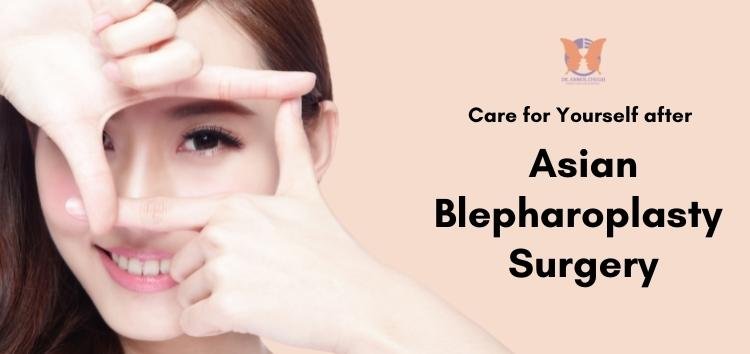
How to Care for Yourself After Your Blepharoplasty or Eyelid Surgery?
Caring for Yourself After Your Blepharoplasty
Before you even get your first glimpse of yourself, it’s important to know that your recovery process is going to be long and hard. You’ll start noticing some improvement within two or three weeks, but the majority of patients don’t see results for six months or more. And once you do see an improvement, the changes could be significant or just subtle.
There are many factors that can affect the healing process including: age, weight, type of surgery performed and pre-existing medical conditions. The most important thing is to be patient and kind with yourself as your journey begins–and never lose sight of what a blessing it is that you’re able to have this surgery at all!
What is Asian Blepharoplasty?
Asian Blepharoplasty is a type of cosmetic surgery that is done on the eyelids. Asian blepharoplasty surgery can be done to reduce the inner corners of the eyes and give them an open, wide-eyed look.
The most common reasons for getting Asian blepharoplasty is to change the shape and size of your eyes, reduce excess skin around your eyes, thinning eyebrows, correct drooping eyelids and puffy bags or to make a tired appearance more refreshed. The surgery procedure takes roughly 45 minutes and it may take up to three weeks until you are fully recovered and able to return home after the surgery.
The procedure mostly uses local anesthesia. After the surgery, patients have stitches which should be removed in 5-7 days time.
Also Read: Asian Blepharoplasty Surgery – Benefits and Treatment Cost in India
The Healing Process and Post-Surgery Tips
As the healing process has to be done with patience and care, there are certain post-surgery tips to keep in mind. Soothing your eyes with cold packs or ice packs can help decrease swelling, redness and pain.
After surgery, we recommend that you follow these instructions to ensure proper healing:
– Sleep : If you are having trouble sleeping, try to avoid eating a heavy meal before bedtime.
– Rest : Try to rest as much as you can during the day and night.
– Eat healthy food : If your mouth is sore, try eating soft and small foods so that you do not have to chew them. Drink some water or tea if your throat is dry.
– Keep your eyes covered when outside in bright sunlight: This will help decrease your sensitivity to light, which may help decrease the pain caused by light being reflected into the eye balls from other sources. Avoid using eye drops in order to protect your eyes from infection.
– Drink plenty of water
– Avoid staying up too late
– Avoid strenuous exercises
– Wear sunglasses outside if your peepers are sensitive to light
– It is avoidable to do activities such as heavy lifting, exercise and stretching for at least 4 weeks after eyelid surgery
Showering after Eyelid Surgery
It is not uncommon for patients to be told to shower after eyelid surgery, but not take a full shower. There are a number of reasons why this would be the case.
First of all, patients are often given heavy-duty antibiotic ointment and antibiotics that can cause irritation on their skin, which could make it painful or even impossible to take a full shower. This is especially true if the procedure was done on the upper eyelid area of the eyes.
Secondly, patients are often advised to refrain from taking long showers in order to avoid excessive exposure to water and bacteria that could lead to an infection. In addition, it is important for them to avoid washing their hair for at least one week after surgery because long exposure can also lead to an infection.
Don’t apply creams or makeup
It is important to follow instructions carefully and avoid applying makeup to your surgical sites for 2 weeks after eyelid surgery.
Doctors recommend that you do not apply creams or makeup such as eye shadow, eyeliner, or mascara to your surgical site for two weeks after eyelid surgery. If you do not follow this instruction, you risk infection as well as ectropion of the lower lid because of pressure from the makeup that was applied.
If you have other skin allergies, it is best to stay away from concealing agents such as foundation cream and rub-in concealers (or any other type of make-up).
Ask to your surgeon about post eyelid surgery
The post-operative care is crucial for the first 3 weeks following surgery. This information is important to know because it will help you in making decisions and taking care of your eyes, which are the most delicate organs in your body. Dr. Anmol Chugh is Board Certified Plastic Surgeon, who has dedicated his time and career to help other people with their cosmetic surgery needs and improvement in life quality.